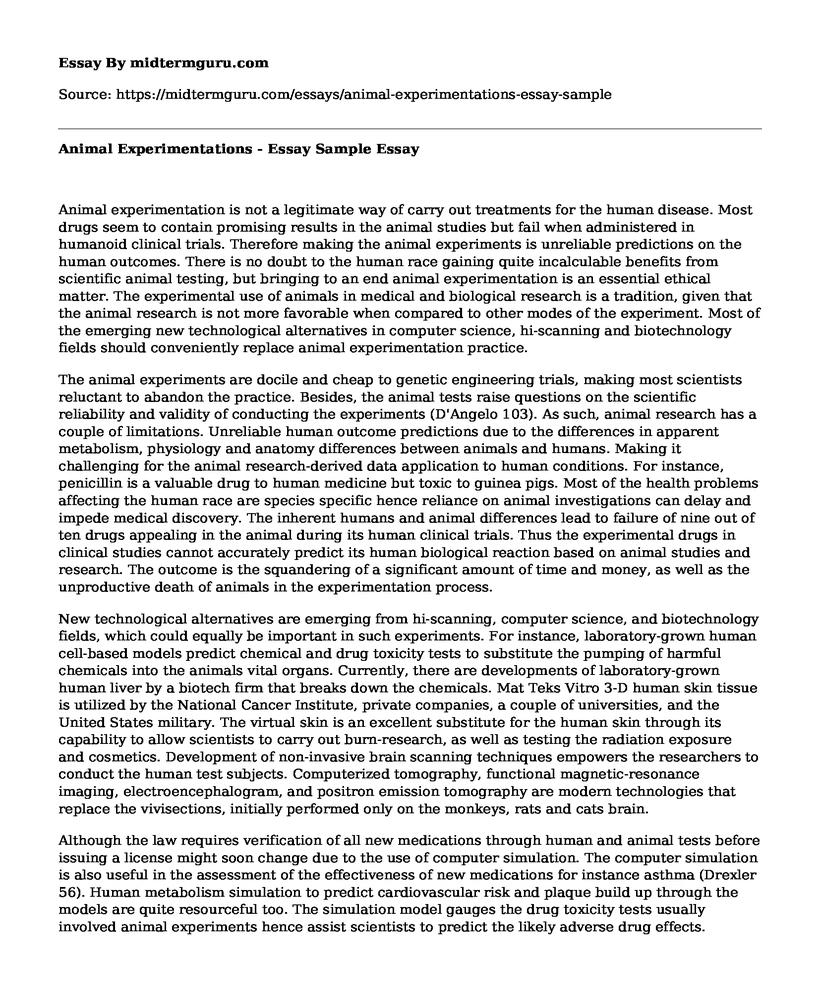Animal experimentation is not a legitimate way of carry out treatments for the human disease. Most drugs seem to contain promising results in the animal studies but fail when administered in humanoid clinical trials. Therefore making the animal experiments is unreliable predictions on the human outcomes. There is no doubt to the human race gaining quite incalculable benefits from scientific animal testing, but bringing to an end animal experimentation is an essential ethical matter. The experimental use of animals in medical and biological research is a tradition, given that the animal research is not more favorable when compared to other modes of the experiment. Most of the emerging new technological alternatives in computer science, hi-scanning and biotechnology fields should conveniently replace animal experimentation practice.
The animal experiments are docile and cheap to genetic engineering trials, making most scientists reluctant to abandon the practice. Besides, the animal tests raise questions on the scientific reliability and validity of conducting the experiments (D'Angelo 103). As such, animal research has a couple of limitations. Unreliable human outcome predictions due to the differences in apparent metabolism, physiology and anatomy differences between animals and humans. Making it challenging for the animal research-derived data application to human conditions. For instance, penicillin is a valuable drug to human medicine but toxic to guinea pigs. Most of the health problems affecting the human race are species specific hence reliance on animal investigations can delay and impede medical discovery. The inherent humans and animal differences lead to failure of nine out of ten drugs appealing in the animal during its human clinical trials. Thus the experimental drugs in clinical studies cannot accurately predict its human biological reaction based on animal studies and research. The outcome is the squandering of a significant amount of time and money, as well as the unproductive death of animals in the experimentation process.
New technological alternatives are emerging from hi-scanning, computer science, and biotechnology fields, which could equally be important in such experiments. For instance, laboratory-grown human cell-based models predict chemical and drug toxicity tests to substitute the pumping of harmful chemicals into the animals vital organs. Currently, there are developments of laboratory-grown human liver by a biotech firm that breaks down the chemicals. Mat Teks Vitro 3-D human skin tissue is utilized by the National Cancer Institute, private companies, a couple of universities, and the United States military. The virtual skin is an excellent substitute for the human skin through its capability to allow scientists to carry out burn-research, as well as testing the radiation exposure and cosmetics. Development of non-invasive brain scanning techniques empowers the researchers to conduct the human test subjects. Computerized tomography, functional magnetic-resonance imaging, electroencephalogram, and positron emission tomography are modern technologies that replace the vivisections, initially performed only on the monkeys, rats and cats brain.
Although the law requires verification of all new medications through human and animal tests before issuing a license might soon change due to the use of computer simulation. The computer simulation is also useful in the assessment of the effectiveness of new medications for instance asthma (Drexler 56). Human metabolism simulation to predict cardiovascular risk and plaque build up through the models are quite resourceful too. The simulation model gauges the drug toxicity tests usually involved animal experiments hence assist scientists to predict the likely adverse drug effects.
Finally, animal experiments ought to come to an end. Scientists and researchers should thereby utilize the new technological advancements. Such technological advances, which could be vital for the replacement of animal experimentations include the laboratory-grown cells, virtual human skin, new brain scanning technologies, and computerized simulation. These technologies are relatively more accurate compared to the widely used animal tests.
Works cited
D'Angelo, John. Ethics in Science: ethical misconduct in scientific research. CRC Press, 2012.
Drexler, Eric. Radical abundance: How a revolution in nanotechnology will change civilization. Public Affairs, 2013.
Cite this page
Animal Experimentations - Essay Sample . (2021, May 25). Retrieved from https://midtermguru.com/essays/animal-experimentations-essay-sample
If you are the original author of this essay and no longer wish to have it published on the midtermguru.com website, please click below to request its removal:
- Essay Sample: Why Focus on Poverty
- Paper Example on Destructiveness of Drug and Alcohol
- Essay Sample on Teenage Pregnancy in Rural Areas
- Definitive Essay on Gender Inequality
- Rise of Synthetic Drug Abuse: The Growing Threat of Bath Salts - Essay Sample
- Brie Files Discrimination Charge Against Employer: Legal Process Explained - Essay Sample
- Gender Wage Gap: Analyzing Earnings Differences in USA - Essay Sample







